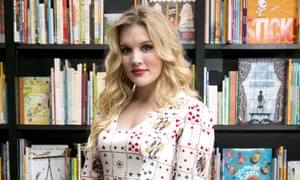
Antiheroes don’t feature in a lot of kids’ or young adult fiction. Likability, someone to root for, victims of clear-cut injustice – classic main characters tend to the plucky and put-upon, à la Harry Potter or Sara Crewe. And dislikable, amoral, even monstrous girls are especially few and far between – girls in fiction, as in real life, it seems, are under more pressure from their readership than their male counterparts to be “nice”. Where are the female Tom Ripleys – or even the Patrick Batemans – of YA? At long last, I’ve noticed some mean girls – not quite a monstrous regiment, but a sinister strike force, at least – popping up in YA and older middle grade (MG) fiction.
In her first novel, Pretty Bad Things (2010), CJ Skuse sketches a bright, acidic portrait of Paisley, one half of the teen Wonder Twins, who go on a crime spree through Vegas en route to find their long-lost dad. Paisley and Beau have both had a traumatic upbringing, witnessing their mum’s death and being farmed out to separate schools by a manipulative grandmother who hides their father’s letters and steals from their trust fund. But, unlike her brother, Paisley hasn’t been crushed into fearful acceptance by the experience. Instead, she’s emerged with a rapier wit (disgustedly describing the girl who sleeps with her boyfriend as “Paris Hilton in a smashed mirror”), a total disregard for boundaries, and an inability to suffer fools and hypocrisy gladly – or, indeed, at all. Written off by umpteen headmistresses as a “bad seed”, Paisley’s bull-in-a-china-shop relish for poor choices, foul language and instant gratification make for a satisfyingly memorable antiheroine, who many good girls might secretly wish to emulate.
Paisley’s successors include Emerald Fennell’s unnamed narrator-protagonist, one of the titular “Monsters” of her most recent novel. At 12 years old, she’s always been a horror – rude, inappropriate, eyes out on stalks to spy into matters that shouldn’t concern her. Like Paisley, she’s always lived in horrendous circumstances; with a mother who doesn’t give a damn, a ghoulish grandma, and now under the control of the sadistic, small-minded uncle who runs the boarding house where she lives. But this girl isn’t the downtrodden, “relatable” heroine of a morality tale, unless it’s a seriously warped and twisted one. Nothing can shake her cheerful relish for death, decay and the grisliest of secrets. And when like-minded Miles comes to stay at the boarding house, coinciding with a spate of murders, the two kids embark on a blissful summer of voyeurism, spying, and youthful sleuthing of the most appalling kind. They may not be the Secret Seven, but they are disturbingly compelling.
Meanwhile, Derek Landy’s heroine Amber, protagonist of the new Demon Road series, is a monster of the most literal kind. Discovering, at 16, that she’s the child of demons and has the power to change her shape, she’s forced to go on the run by the realisation that her parents have bred her in order to kill and eat her. Throwing in her lot with Milo, a dubious character who has much to hide and a sentient car, Amber discovers just what she’s prepared to do in order to survive. Nondescript as a human girl, she swiftly begins to relish the beauty and strength of her horned, red-skinned demonic second self (acquiring a brilliantly hapless Irish fanboy along the way) and enjoy the scope for making mayhem that goes with it.
Less literally, Louise O’Neill, author of Only Ever Yours, has taken the brave, necessary step of making the central character of her new novel Asking for It, a horrific indictment of rape culture, thoroughly un-angelic. Not only does Emma enjoy sex, experiment with substances, and wear skimpy clothes that her brother calls “a bit slutty” – she’s also unkind; mistress of the biting putdown, the carefully-judged queen-bee sting that punctures her friends’ self-esteem. She is the girl who pretends not to study, the undercutter of others’ efforts to do well and fit in. And she doesn’t deserve the horror of what happens to her, any more than would the “perfect victim” of media legend.
As Claire Messud, author of The Woman Upstairs, asserted during an interview with Publishers’ Weekly: “If you’re reading to find friends, you’re in deep trouble … The relevant question isn’t ‘Is this character a friend for me?’ but ‘Is this character alive?’”
To me, mean, monstrous and even murderous girls are frequently far more alive – and believable – than their mealy-mouthed, “relatable” counterparts. So hats off to the authors creating girls who feel anger, lust, the sneaking impulse to put others down, and the whole gamut of emotions, not just the “acceptable” ones. I hope there’ll be more to follow.

No comments:
Post a Comment